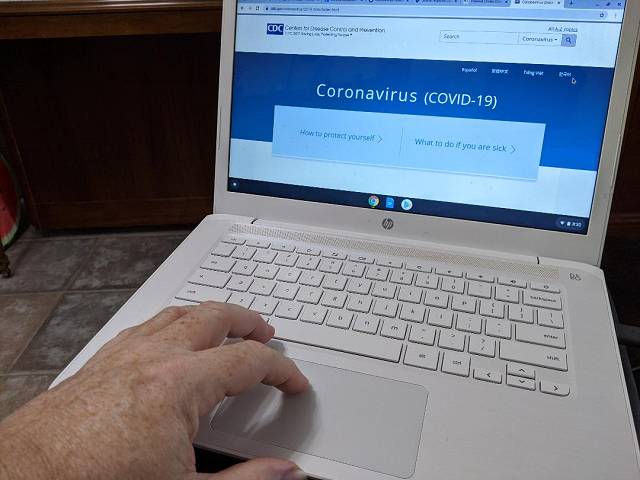WASHINGTON, D.C. – The Federal Bureau of Investigation (FBI) is warning people that the rise in fear due from the COVID-19 pandemic is also giving rise to increased efforts on the part of scammers to steal your money through fraudulent donations or schemes to get personal information that would give them to your bank, credit card, PayPal or other financial accounts.
A recent release from the FBI advises:
Scammers are leveraging the COVID-19 pandemic to steal your money, your personal information, or both. Don’t let them. Protect yourself and do your research before clicking on links purporting to provide information on the virus; donating to a charity online or through social media; contributing to a crowdfunding campaign; purchasing products online; or giving up your personal information in order to receive money or other benefits. The FBI advises you to be on the lookout for the following:
Fake CDC Emails. Watch out for emails claiming to be from the Centers for Disease Control and Prevention (CDC) or other organizations claiming to offer information on the virus. Do not click links or open attachments you do not recognize. Fraudsters can use links in emails to deliver malware to your computer to steal personal information or to lock your computer and demand payment. Be wary of websites and apps claiming to track COVID-19 cases worldwide. Criminals are using malicious websites to infect and lock devices until payment is received.
Phishing Emails. Look out for phishing emails asking you to verify your personal information in order to receive an economic stimulus check from the government. While talk of economic stimulus checks has been in the news cycle, government agencies are not sending unsolicited emails seeking your private information in order to send you money. Phishing emails may also claim to be related to:
- Charitable contributions
- General financial relief
- Airline carrier refunds
- Fake cures and vaccines
- Fake testing kits
Counterfeit Treatments or Equipment. Be cautious of anyone selling products that claim to prevent, treat, diagnose, or cure COVID-19. Be alert to counterfeit products such as sanitizing products and Personal Protective Equipment (PPE), including N95 respirator masks, goggles, full face shields, protective gowns, and gloves. More information on unapproved or counterfeit PPE can be found at www.cdc.gov/niosh. You can also find information on the U.S. Food and Drug Administration website, www.fda.gov, and the Environmental Protection Agency website, www.epa.gov. Report counterfeit products at www.ic3.gov and to the National Intellectual Property Rights Coordination Center at iprcenter.gov.
If you are looking for accurate and up-to-date information on COVID-19, the CDC has posted extensive guidance and information that is updated frequently. The best sources for authoritative information on COVID-19 are www.cdc.gov and www.coronavirus.gov. You may also consult your primary care physician for guidance.
The FBI is reminding you to always use good cyber hygiene and security measures. By remembering the following tips, you can protect yourself and help stop criminal activity:
- Do not open attachments or click links within emails from senders you don’t recognize.
- Do not provide your username, password, date of birth, social security number, financial data, or other personal information in response to an email or robocall.
- Always verify the web address of legitimate websites and manually type them into your browser.
- Check for misspellings or wrong domains within a link (for example, an address that should end in a “.gov” ends in .com” instead)
If you believe you are the victim of an Internet scam or cybercrime, or if you want to report suspicious activity, please visit the FBI’s Internet Crime Complaint Center at www.ic3.gov.
Do not respond to anyone seeking bank account information by phone or email for your stimulus check
It has been reported that some people have been contacted by a supposed IRS representative, asking for bank account information in order to direct deposit stimulus checks. You should not give that information. The real IRS issued this statement on Monday about stimulus payments.
The Treasury Department and the Internal Revenue Service today announced that distribution of economic impact payments will begin in the next three weeks and will be distributed automatically, with no action required for most people. However, some seniors and others who typically do not file returns will need to submit a simple tax return to receive the stimulus payment.
Who is eligible for the economic impact payment?
Tax filers with adjusted gross income up to $75,000 for individuals and up to $150,000 for married couples filing joint returns will receive the full payment. For filers with income above those amounts, the payment amount is reduced by $5 for each $100 above the $75,000/$150,000 thresholds. Single filers with income exceeding $99,000 and $198,000 for joint filers with no children are not eligible.
Eligible taxpayers who filed tax returns for either 2019 or 2018 will automatically receive an economic impact payment of up to $1,200 for individuals or $2,400 for married couples. Parents also receive $500 for each qualifying child.
How will the IRS know where to send my payment?
The vast majority of people do not need to take any action. The IRS will calculate and automatically send the economic impact payment to those eligible.
For people who have already filed their 2019 tax returns, the IRS will use this information to calculate the payment amount. For those who have not yet filed their return for 2019, the IRS will use information from their 2018 tax filing to calculate the payment. The economic impact payment will be deposited directly into the same banking account reflected on the return filed.
The IRS does not have my direct deposit information. What can I do?
In the coming weeks, Treasury plans to develop a web-based portal for individuals to provide their banking information to the IRS online, so that individuals can receive payments immediately as opposed to checks in the mail.
I am not typically required to file a tax return. Can I still receive my payment?
Yes. People who typically do not file a tax return will need to file a simple tax return to receive an economic impact payment. Low-income taxpayers, senior citizens, Social Security recipients, some veterans and individuals with disabilities who are otherwise not required to file a tax return will not owe tax.
How can I file the tax return needed to receive my economic impact payment?
IRS.gov/coronavirus will soon provide information instructing people in these groups on how to file a 2019 tax return with simple, but necessary, information including their filing status, number of dependents and direct deposit bank account information.
I have not filed my tax return for 2018 or 2019. Can I still receive an economic impact payment?
Yes. The IRS urges anyone with a tax filing obligation who has not yet filed a tax return for 2018 or 2019 to file as soon as they can to receive an economic impact payment. Taxpayers should include direct deposit banking information on the return.
I need to file a tax return. How long are the economic impact payments available?
For those concerned about visiting a tax professional or local community organization in person to get help with a tax return, these economic impact payments will be available throughout the rest of 2020.
Where can I get more information?
The IRS will post all key information on IRS.gov/coronavirus as soon as it becomes available.
The IRS has a reduced staff in many of its offices but remains committed to helping eligible individuals receive their payments expeditiously. Check for updated information on IRS.gov/coronavirus rather than calling IRS assistors who are helping process 2019 returns.
Copyright 2020 Humble Roots, LLC. All Rights Reserved.






















